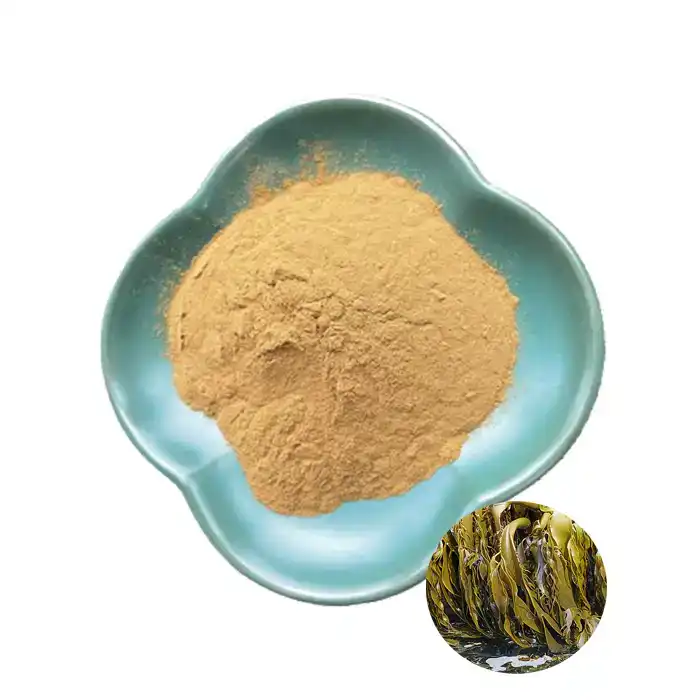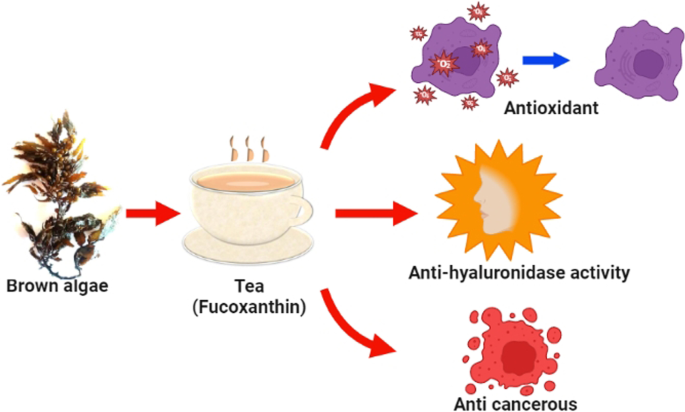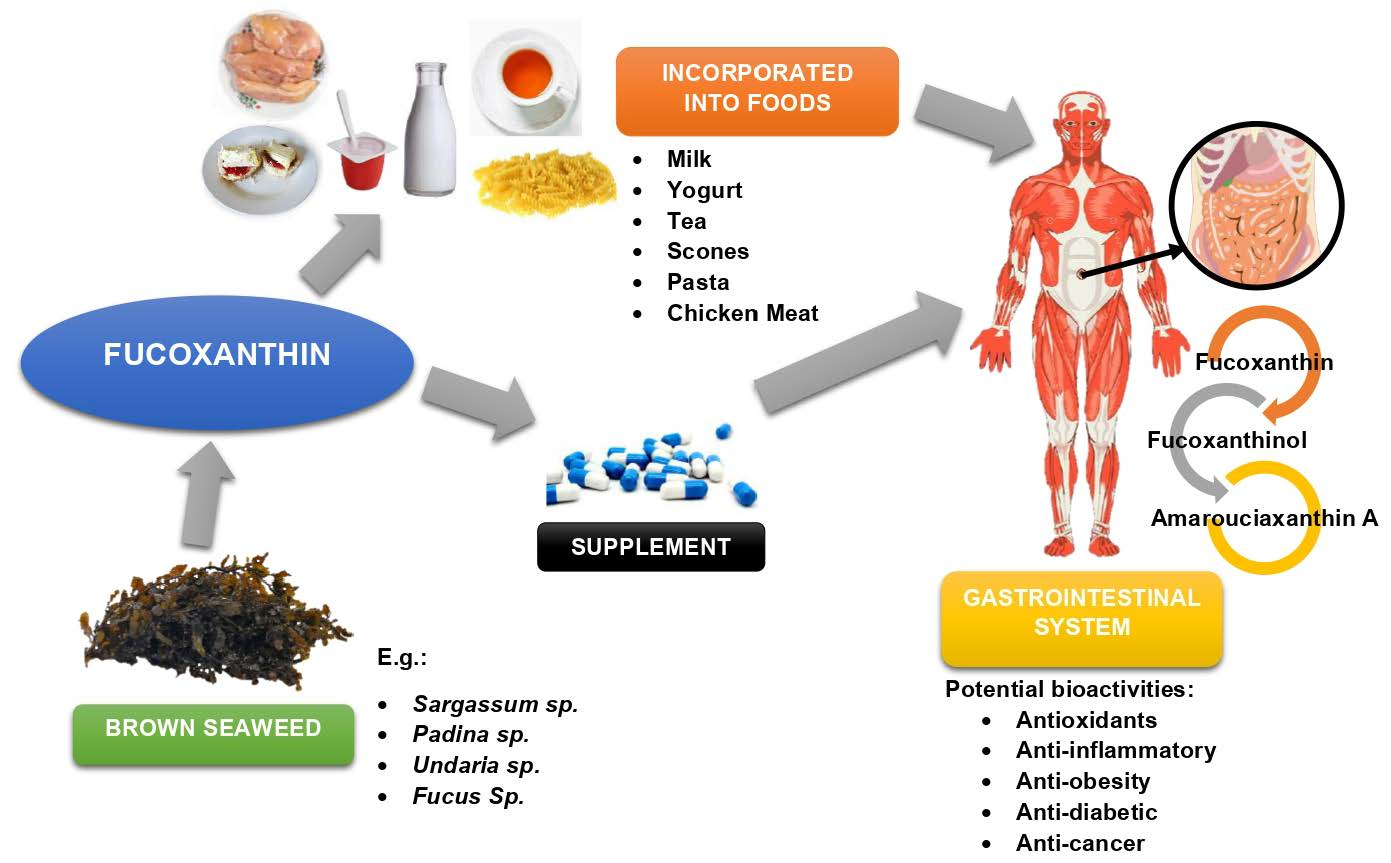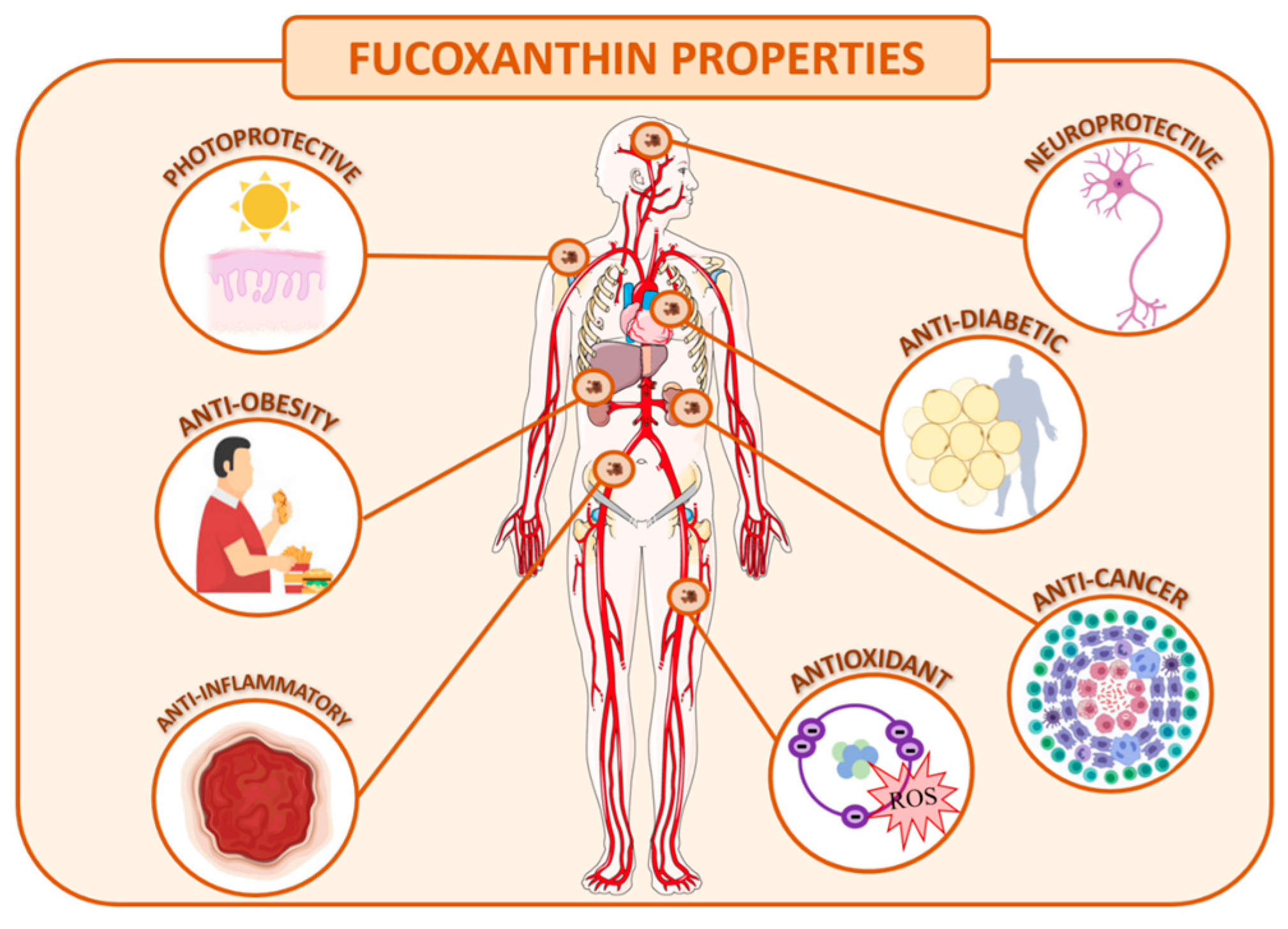What are the health benefits of fucoxanthin powder
Fucoxanthin is an epoxy xanthophyll carotenoid that accounts for about 10% of all carotenoids produced. It is found in various species of microalgae (diatoms) and macroalgae (brown seaweeds) and is sold as a dietary supplement ingredients.
Limited access to sunlight, the pH, salinity, and conductivity of seawater during winter increase fucoxanthin production, whereas high seawater temperature and prolonged sunlight exposure during summer decrease its concentrations.
FDA has allowed the use of fucoxanthin from Phaeodactylum tricornutum as a new dietary ingredient. The approved daily dose has been 3mg daily for an indefinite time or 5mg for up to 90 days.
Fucoxanthinol may be the primary active metabolite of fucoxanthin in humans. It is mainly stored in white adipose tissue (body fat).
What is Fucoxanthin Powder?
Fucoxanthin powder is a unique pigment of brown algae, which is a natural and highly active carotenoid, and widely present in various algae, marine phytoplankton, aquatic shellfish and other animals and plants. Studies have found that it has anti-tumor, anti-inflammatory, antioxidant, weight loss, nerve cell protection and other effects, and has been widely used in the market as drugs, skin care and beauty products and health care products.

Classification & Structure
Fucoxanthin is an epoxy xanthophyll carotenoid (epoxycarotenoid) with a molecular formula of C42H58O6, accounting for about 10% of total produced carotenoids. It is also a non-provitamin A carotenoid, meaning it doesn’t exhibit vitamin A activity.
Fucoxanthin is an accessory pigment and a vital structural component of light-harvesting complexes. It also protects the microalgae from the molecular damage caused by sunlight.
Fucoxanthin degrades when exposed to light, heat, enzymes, oxygen, unsaturated fats, and prooxidant molecules. Its low water solubility and bioaccessibility limit its applications in the pharmaceutical and food industries.
Uses
Fucoxanthin is a member of the carotenoid family, and is found naturally in some types of seaweed, such as wakame. Like most carotenoids, fucoxanthin is an antioxidant.Animal studies by one group of researchers suggest that fucoxanthin might prevent the growth of fat tissue and reduce abdominal fat.However, no studies have been done to see if this effect is achievable in humans. Anti-cancer properties of fucoxanthin have also been identified in test tube studies, and anti-inflammatory effects have been shown in test tube and animal research. Whether any of these potential health effects could help humans is uncertain, because fucoxanthin present in seaweed was shown to be absorbed quite poorly from the human digestive tract in one study.

Health Benefits of Fucoxanthin
Fucoxanthin, via its metabolites, seems to be stored in fat cells for a prolonged period of time and can induce fat loss while inhibiting fat cell differentiation and proliferation. Although only one human study has been published, it appears to be a promising non-stimulatory fat loss agent but requires time to work (5-16 weeks).
It also possesses other health benefits, such as correcting abnormalities in glucose metabolism in muscle tissue which can help diabetics and might reduce cholesterol levels and triglycerides by currently unverified mechanisms. Reductions in blood pressure and reductions in both liver fat stores and liver enzyme values have been noted with fucoxanthin supplementation in humans.
Fucoxanthin, although usage as a supplement is preliminary, appears to be a very promising joint fat loss and health boosting agent.
Liver Health
Metabolic syndrome is a key risk factor in developing Non-Alcoholic Fatty Liver (NAFL) condition, a dangerous build-up of lipid deposits in the liver. NAFL is the most common liver abnormality, affecting 1 out of 4 people. Untreated NAFL may progress to severe liver damage.
Fucoxanthin can reduce the accumulation of lipids in the liver, and in fact, it was shown in an in vitro study that a microalgae-derived fucoxanthin extract, FucoVitalTM by Solabia – Algatech Nutrition, significantly inhibits lipid accumulation in liver cells Moreover, even fucoxanthinol, which is a fucoxanthin metabolite found in the human plasma after oral consumption of fucoxanthin, was also found to be an effective inhibitor of cellular lipid accumulation.

Antioxidant Properties
Fucoxanthin is a potent antioxidant, which means it helps combat oxidative stress in the body. Oxidative stress occurs when there is an imbalance between free radicals and antioxidants, leading to cellular damage. This damage is linked to aging and various diseases, including cancer and cardiovascular conditions. By neutralizing free radicals, Fucoxanthin may help reduce the risk of these diseases, supporting overall health and longevity.
Anti-inflammatory Effects
In addition to its antioxidant properties, Fucoxanthin is also known for its anti-inflammatory effects. Chronic inflammation is a common underlying factor in many health conditions, including heart disease, diabetes, and arthritis. Fucoxanthin may help reduce inflammation in the body, potentially lowering the risk of these chronic conditions. This makes it a valuable addition to a health-focused diet or supplement regimen.

Metabolic Health
Fucoxanthin has shown promise in improving metabolic health, particularly in the regulation of blood sugar levels. Some studies suggest that Fucoxanthin may help enhance insulin sensitivity, which is crucial for maintaining healthy blood sugar levels and preventing conditions like type 2 diabetes. Additionally, its effects on fat metabolism may also contribute to better cardiovascular health, making it a multifaceted tool for metabolic wellness.

Other Potential Uses of Fucoxanthin
Skin Health
Emerging research suggests that Fucoxanthin may benefit skin health by protecting against UV radiation and reducing the signs of aging. Its antioxidant and anti-inflammatory properties are believed to help protect the skin from damage caused by sun exposure and environmental stressors, potentially keeping the skin looking youthful and vibrant.
Immune Support
Fucoxanthin may also play a role in supporting the immune system. Its anti-inflammatory and antioxidant effects may help boost the body’s natural defences, making it easier to fight off infections and maintain overall wellness. While more research is needed, these potential benefits make Fucoxanthin an interesting area of study for immune health.
Neurological Health
Another emerging area of interest is the potential impact of Fucoxanthin on brain health. Some studies suggest that it may help protect against neurodegenerative diseases and improve cognitive function. This is likely due to its ability to reduce oxidative stress and inflammation, both of which are linked to brain aging and decline. While the research is still in its early stages, these findings are promising for the future use of Fucoxanthin in supporting neurological health.

How to Take Fucoxanthin and Side-Effects
As stated in the Journal of Agriculture and Food Chemistry and Marine Drugs, fucoxanthin has a remarkable track record in human clinical studies of having “no adverse effects reported.”
That being said, always check with a healthcare provider before taking any new dietary supplement — just because a molecule hasn’t been shown to have adverse effects in clinical research doesn't mean it’s impossible to be allergic to fucoxanthin.
Supplementing with 8mg of fucoxanthin daily will provide all of the scientifically verified benefits of this molecule for $0.20 to $1.00 per dosage, depending on which brand you choose.
Fucoxanthin is worth taking as a dietary supplement because it is a medicinal food source in many ways.
If you want to lose weight, reduce pain, and improve biomarkers related to general health and longevity on your next blood test, consider supplementing with fucoxanthin.
The scientific consensus in each of these benefits is that it can — with “statistical significance” — massively help, with no adverse effects and at a low cost. That is why you should be supplementing with fucoxanthin.

Conclusion
Fucoxanthin powder is a multifunctional health ingredient with a wide array of scientifically supported benefits, including weight management, cardiovascular support, liver protection, and more. As the demand for plant-based, effective nutraceuticals continues to grow, fucoxanthin stands out as a natural, versatile compound that offers both preventive and therapeutic potential.
For brands and formulators looking to develop cutting-edge health supplements or skincare products, fucoxanthin powder represents a high-value, scientifically backed solution.
References
https://link.springer.com/referenceworkentry/10.1007/978-3-031-28109-9_55
https://www.frontiersin.org/journals/pharmacology/articles/10.3389/fphar.2022.929442/
https://pubchem.ncbi.nlm.nih.gov/compound/Fucoxanthin
https://www.sciencedirect.com/science/article/pii/S2211926423003909#
https://pmc.ncbi.nlm.nih.gov/articles/PMC9368577/
https://www.sciencedirect.com/science/article/abs/pii/S138819812030010X
https://pmc.ncbi.nlm.nih.gov/articles/PMC10146066/
https://pmc.ncbi.nlm.nih.gov/articles/PMC8269564/
https://pmc.ncbi.nlm.nih.gov/articles/PMC3148495
https://pubmed.ncbi.nlm.nih.gov/34792011/
https://www.mdpi.com/1467-3045/46/6/357
Send Inquiry
Related Industry Knowledge
- Hericium Erinaceus: Unlocking the Potential of the Lion’s Mane Mushroom
- Is NMN Powder the Future of Anti-Aging Supplements?
- The main trend of pet nutrition products-natural and clean
- Quercetin vs Astaxanthin
- Is Borage Oil Safe
- Organic Hemp Protein Powder for Weight Gain
- Blue spirulina smoothie
- Glutathione-Rich Yeast Extract: Powering Health, Protecting Cells, Brightening Life!
- Eicosapentaenoic Acid and Omega-3 Fatty Acids


